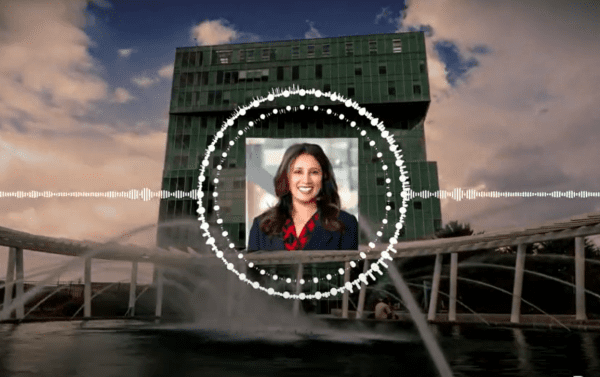Charlotte Business Buzz: Leadership in Tumultuous Times

While change is a natural part of business evolution, the level of stress and anxiety that the COVID-19 pandemic is bringing is not.
Janaki Gooty, associate professor in the Department of Management in the Belk College of Business and in the interdisciplinary Organizational Science Ph.D. program, says many business leaders are scrambling now because they are facing so many threats all happening at the exact same time.
Gooty is leading a team of UNC Charlotte researchers who are studying the impact COVID-19 is having on work stress and well-being in the workplace. She sat down with Jeffrey Jones, director of Executive Education and Continuing Education at the Belk College, to discuss her research and to offer practical tips for leaders. The interview is for Charlotte Business Buzz, a new podcast mini-series presented by the Belk College and the Office of Industry and Government Partnerships.
You’re currently studying leadership in the COVID-19 pandemic. Can you tell us more about what you hope to find?
This team of researchers at the Belk College of Business in Charlotte, we are trying to do better science than has come before us in leadership. And that’s not to say that everything that’s been done before in leadership is bad, but, you know, if this were a drug, it would not be passing clinical trials, about 98 percent of it. What does that mean? In terms of research methods, we’re trying to do better science than a lot of what has come before.
Typically, when we have a crisis, we have one or two threats. For example, there might be a loss of life or there might be a threat to the environment, as with the BP oil crisis. But with COVID-19, what’s happening is that we have all of these threats all happening at the exact same time, and the strength of these threats are actually growing at exponential rates.
So, for example, we have threat to life, threat to jobs, income, we have supply chain shortages, we have a healthcare system that’s overloaded, and along with that we have mental health challenges that are starting to crop up.
This is why we are all scrambling and saying:
-
What is it that leaders should be attending to first?
-
How do they decide which is a priority in order for them to remain relevant and also for their leadership to be effective?
-
Should they be fearful?
-
Should they communicate fear about this pandemic to their followership therefore encouraging followers to also take it seriously?
-
Or should they remain optimistic about the future so that we do not have a global mental health crisis?
These are the types of questions that our research team is trying to answer.
 “These negative emotions, such as sadness, and anger and frustration and fear have actually evolved as our response to threat in the environment. They’re tied to our survival.”
“These negative emotions, such as sadness, and anger and frustration and fear have actually evolved as our response to threat in the environment. They’re tied to our survival.”
We’ve all had differing levels of stress and experienced a variety of emotions throughout this pandemic. What can your research offer us in terms of emotions?
The first lesson that emerges from the sciences, and this is based on the research that I’ve been doing … is this: You know that old Beatles song, “Let It Be”? Well, they had it right. The mantra really is, “You have to learn to let it be.”
You know, these negative emotions, such as sadness, and anger and frustration and fear have actually evolved as our response to threat in the environment. They’re tied to our survival.
So, we should not try to numb them, but we should feel what we’re feeling … and understand what information they are giving us.
So, what are you going to do about it? The simple prescription is what we call active coping. So, active coping is simply about creating all of these action steps and plans, knowing fully well that these plans and action steps may not work, might fall apart. But having plans – and your best-case and worst-case scenarios should be addressed in those plans – give us back some of our sense of agency and control.
Right now, COVID-19 is causing anxiety, fear and anger perhaps. Is there anything about this event that is highlighting opportunities to us? For example, we are hearing a lot about how manufacturing in this country could be revived because of this crisis. It has really highlighted an opportunity that we have not capitalized on in America. That’s an example of how we can reframe a crisis in a way that actually helps us and our adaptation and our survival.
This is something that’s very, very important and this is about engaging in anything that feeds your body as well as your mind. In some of my research, we have found that mind-body techniques, be it yoga or be it meditation or be it tai chi, but all of these techniques that focus on the breath along with movement, they promote higher levels of coping and lesser burnout amongst employees.
How have you applied this to your own reaction recently?
If you think about this research we have launched, leadership during COVID, during the early part of all of this, you know my world was drastically changing. We went to teaching online almost overnight, and I was witnessing what was happening, not only with my immediate leadership, which would be the Belk College of Business’ leadership, but also how they were adapting, how they were conducting these large-scale faculty meetings online, but the other side of it is I was looking at how my students were coping, and I started to notice, you know, it’s very interesting that people are viewing this very differently.
Yes, there’s fear. Yes, there’s anxiety, but there was also pretty much a sense of resilience about everyone pretty much in my work orbit, and that’s what prompted this active coping strategy for me. So, we launched the leadership during COVID-19 project because this was something that my research team and I, we felt this gives us a sense of purpose.
Knowing that we don’t have all the answers for leaders during the COVID-19 pandemic, what are some practical tips from the science of leadership that you would share with us at this time?
The no. 1 thing you have to do as a leader during this time is to acknowledge and validate what your employees are thinking as well as feeling.
It’s important to realize that leaders are not only managing their own emotions, but they are also managing these emotions of other people, i.e. the workforce. So, the key here is to acknowledge that you are doing what I call twice the emotional work. Not only are you doing it for yourself, but you are doing it for your workforce.
You have to move beyond acknowledging and validating the present situation, right? We cannot stay in that space of this is challenging and undesirable … we have to move past it. Leaders are in a position to reframe the threat in a way that mobilizes us for change and also know that leaders are in our corner.
If you had 45 seconds to give a pep talk to leaders during this challenging time, what would it be?
I have many leaders say, this is really, really hard, right? And by describing something as a hardship, you’re setting up a fight or flight response to a threat. When I tell you there’s something hard out there, evolutionary you are hard wired to fight that threat.
Is it really hard or is it simply that this is a novel situation? I would encourage leaders to use language carefully because much of what we are facing, from homeschooling, no social interaction, our movement is restricted. All of this is new to us, but fundamentally, that is not threatening our survival.
So, do we want to use language that promotes challenge appraisals where people say this is just new, but I can mobilize resources to cope? Or do we want to set this up as something that causes more negative emotions? This is up to the leader.
Dr. Gooty is currently recruiting participants in the Charlotte region for an ongoing Stress in the Workplace study. Note: The interview has been edited for clarity and space. The full interview is available through Charlotte Business Buzz.
About the Belk College of Business
The Belk College of Business at UNC Charlotte is North Carolina’s urban research business school. Accredited by AACSB International, the Belk College of Business offers outstanding business education at the undergraduate and graduate levels, along with executive education. The Belk College has been educating future business leaders for nearly 50 years. With more than 4,600 students, almost 160 full-time faculty and staff, and more than 33,000 alumni, the Belk College is one of the Carolinas’ largest business schools.
 “These negative emotions, such as sadness, and anger and frustration and fear have actually evolved as our response to threat in the environment. They’re tied to our survival.”
“These negative emotions, such as sadness, and anger and frustration and fear have actually evolved as our response to threat in the environment. They’re tied to our survival.”